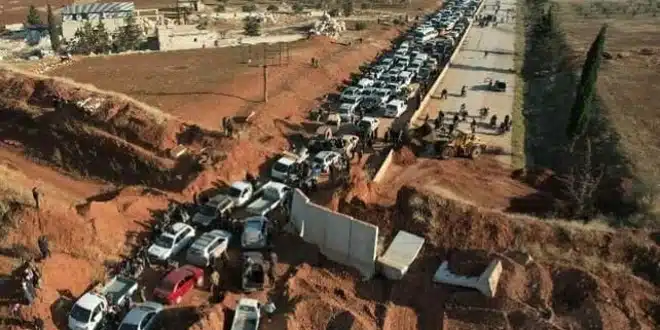More than a million people, primarily women and children, have been displaced in Syria following a recent rebel offensive that led to the ousting of President Bashar al-Assad, according to the United Nations humanitarian agency.
The UN Office for the Coordination of Humanitarian Affairs (OCHA) reported that since the escalation of hostilities on November 27, approximately 1.1 million people have been newly displaced, with the majority being women and children.
In response to years of abuses under the former president, Syria’s interim government has committed to establishing the rule of law. The United States has cautioned against actions that could provoke further conflict.
Bashar al-Assad fled Syria after a swift offensive led by the Islamist group Hayat Tahrir al-Sham (HTS) and its allies, ending five decades of his family’s repressive rule. Syrians celebrated worldwide, having endured years of oppression and nearly 14 years of war that resulted in over 500,000 deaths and millions displaced.
A spokesperson for the new government announced that the country’s constitution and parliament would be suspended for a three-month transition period. A judicial and human rights committee will review and amend the constitution. Speaking from the state television headquarters, which is now controlled by the rebels, the spokesperson emphasized the commitment to the rule of law and justice for those who committed crimes against the Syrian people. He also assured respect for religious and cultural diversity in Syria.
US Secretary of State Antony Blinken, while in Jordan, stressed the importance of avoiding actions that could ignite new conflicts. He referenced recent Israeli and Turkish military activities in Syria. Blinken emphasized the US aim to prevent Syria from becoming a base for terrorism and a threat to its neighbors, noting the presence of hundreds of US troops in Syria as part of a coalition against Islamic State jihadists. This presence has been contentious, particularly for Turkey and Israel.
UN Secretary-General Antonio Guterres expressed concern over Israeli airstrikes, which Israeli forces have justified by aiming to prevent abandoned Syrian military equipment from falling into the wrong hands. Blinken also mentioned efforts to bring home American Travis Timmerman, who was recently released by Syria’s new leadership, and ongoing cooperation to locate other US citizens who disappeared under Assad’s regime, including journalist Austin Tice.
Leaders from the Group of Seven (G7) nations have expressed support for Syria’s transition to an inclusive, non-sectarian government, emphasizing the importance of human rights and accountability for Assad’s regime’s crimes.
The body of outspoken activist Mazen al-Hamada, who testified about torture in Syrian prisons, was recently found in a Damascus hospital morgue. The joy of Assad’s overthrow is tempered by uncertainty about the future of the diverse Syrian society.
HTS, rooted in Syria’s Al-Qaeda branch, has pledged to bring justice for Assad’s victims. HTS leader Abu Mohammed al-Jolani, now using his real name Ahmed al-Sharaa, called for international cooperation to extradite criminals who fled Syria.
UN investigators have compiled secret lists of 4,000 individuals responsible for serious crimes in Syria since the civil war began. The UN’s World Food Programme has appealed for $250 million to assist displaced and vulnerable people in Syria over the next six months.
Jordan will host a Syria crisis summit with foreign ministers from various Western and Arab countries, as well as Turkey. Following the suspension of activities by Assad’s Baath party, many former members, like Maher Semsmieh, have renounced their affiliation.
Assad, previously supported by Russia, Iran, and Hezbollah, saw his regime collapse as rebels launched their offensive on November 27, coinciding with a ceasefire in the Israel-Hezbollah conflict. Israel has since moved troops into the UN-patrolled buffer zone on the Golan Heights, a move the UN claims violates a 1974 armistice. In the Israeli-occupied Golan Heights, many Druze Arab residents hope for a return to Syrian control, expressing a cautious optimism for the future.
 The Daily Star Ireland
The Daily Star Ireland



